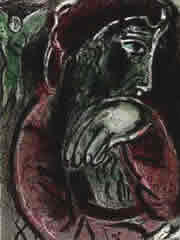The Story of Job:
Personal Disaster Reveals Genuine Faith
For Sunday October 25, 2009
Lectionary Readings (Revised Common Lectionary, Year B)
Job 42:1–6, 10–17 or Jeremiah 31:7–9
Psalm 34:1–8, (19–22) or Psalm 126
Hebrews 7:23–28
Mark 10:46–52
In church a few years ago a nurse who had worked for twenty-five years as an intensive care specialist described her daily responsibilities on the boundary line between life and death. Marsha joked that when she started nursing right out of college as a twenty-one year old, it never occurred to her that people died in the ICU. Her naivety was short lived.
When a patient dies, Marsha unplugs the monitors, disconnects the IV, removes the tangle of wires and tubes from the person, changes the bed linens one last time, and then washes the body before the family comes to view their loved one. After the family leaves, she then pulls a plastic sheet over the corpse and bags the body for final removal — a grim task and a sacred moment that even today she finds disconcerting.
Twenty-five years in the ICU has made Marsha an astute observer of human nature. Many terminally ill patients and their families, she says, negotiate the passage from life to death with grace, confidence, equanimity, and a strong faith in God their redeemer. Others become unglued. For them the specter of death provokes feelings of bitterness, fear, denial, and hopelessness.
 |
Satan Smites Job with Boils by William Blake (1757-1827). |
Marsha's observations made me wonder — when forces like death press us beyond our control, push us to the extremes of human helplessness, what happens to the faith we believe, and to our faith with which we believe? When fires purge our faith of all dross, what remains? That is the lesson of Job.
The "patience of Job" has passed into our vernacular as a common proverb, but I've never understood why. Between the prologue of Job (1:1–2:13) and the epilogue (42:7–17), most of this ancient story is an acrimonious debate between Job and his three friends, Eliphaz, Bildad, and Zophar (3:1–31:40). They insist that Job deserves his misfortune and therefore needs to repent, but Job protests his innocence. He complains, despairs, doubts, questions, anguishes, and resigns himself to his mysterious fate. He is anything but "patient" in the normal sense of that word. Nor does the book of Job deal directly with broad and important philosophical questions like why the wicked prosper, why God sometimes feels silent and hidden, or why the moral calculus in our world sometimes does not seem to add up.
Rather, the book of Job explores a specific question about the relationship between piety and prosperity. Although Job never learns the origin or purpose of his ordeal, the writer-narrator informs us as readers. In this story, Satan comes before God with a provocative accusation: "does Job fear God for nothing?" (1:9). He insinuates that Job's faith has ulterior motives. Doesn't Job expect a quid pro quo of some sort, divine blessings for human faith or faithfulness?
 |
Job and his three friends by Gustav Dore (1832-1883). |
The accuser-adversary (for such is the literal meaning of his name in Hebrew) then makes a wager with God. He bets that he can prove that for Job, an immensely wealthy man with a wonderful family, God is nothing more than a Cosmic Sugar Daddy. His faith in Yahweh is fueled by its benefits. God, Satan charges, is really no more than a rabbit's foot or good luck charm to Job. Test him and try him, squeeze him, Satan wagers, and you will see that Job's faith is opportunistic and egocentric rather than gratuitous and theocentric.
God accepts Satan's wager and permits Job to be "ruined without reason" (2:3). A first wave of disasters decimates Job's extravagant wealth and kills his ten children. Then Satan ravages Job's health with festering boils from head to foot. To say that life hands him a dramatic reversal would be a gross understatement. But despite his impatience, his agonizing questions, and emotional outbursts, Job passes the tests with flying colors at each stage of the drama.
 |
Job prays, French, c. 1410. |
Before his fiasco began, we read that Job was "blameless and upright; he feared God and shunned evil" (1:1). During the crisis, and contrary to what we might naturally think, the narrator insists that "in all this, Job did not sin by charging God with wrongdoing;" "he did not sin in what he said" (1:22; 2:10). Though "ruined without reason," God tells Satan that Job still "maintained his integrity" (2:3). After the fiasco, the epilogue ends with another reversal of a different sort. Whereas at the beginning of the story Job sought the help of Eliphaz, Bildad, and Zophar, at the end God commands them to seek Job's prayers and intercession. They had wrongly charged Job with brash impiety, but God rightly charged them with "folly" — they "have not spoken of me what is right, as my servant Job has" (42:7).
The story of Job contains several important lessons. In the New Testament, James commends Job for his perseverance (James 5:11). Eliphaz, Bildad, and Zophar warn us of the dangers of trying to "help" or "fix" our friends when they suffer, despite our best intentions. Even though he wore his heart on his sleeve and fully vented his emotions, God affirmed that Job "spoke rightly," which is a reminder that there's no need to sanitize your feelings before God. Job also teaches that we should not make a direct or necessary connection between rewards and punishments in this life with a person's sin or righteousness. Encountering the majesty and mystery of God, Job confessed that he "surely spoke of things I did not understand" (42:3), and it was precisely his admission of ignorance and embrace of modesty that led him from second hand knowledge about God to a direct and personal experience with God: "My ears had heard of you, but now my eyes have seen you" (42:5).
 |
Job in Despair, by March Chagall, 1960. |
In addition to all of these, though, the primary lesson of this ancient story includes a most contemporary application. Many television preachers and books teach that God wants you healthy, wealthy, and wise (if you send them your money). Job categorically exposes that lie for the self-serving idolatry that it is. In his book Forty Acres and a Goat Will Campbell derides such teachers as "electronic soul molesters." Genuine faith does not manipulate God for material gain, fear of punishment, or avoidance of unjust suffering.
I've always appreciated how the Lutherans of the Reformation made this point. They distinguished between earthly "security" (securitas), a presumption that no one should expect as an entitlement or reward for faith, and "certitude" (certitudo), the unfailing promise of God's presence whatever comes your way.
For further reflection
* Have you ever used faith to try to gain material advantage? How?
* How and why do life's hardships reveal our faith for what it really is?
* Which lessons from Job speak to you most clearly, and why?
* Do you find the Lutheran distinction between "security" and "certainty" helpful?
* See Gustavo Gutierrez, On Job: God-Talk and the Suffering of the Innocent (1987).
Image credits: (1) Web Museum, Paris; (2) Biblioteca Pléyades; (3) J. Paul Getty Museum Collection; and (4) www.GallerieArt.cz.





